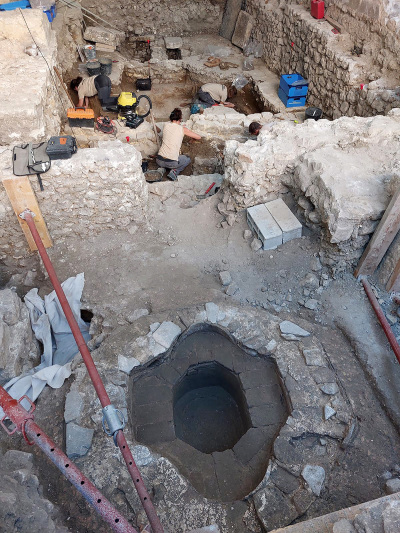
Archaeologists in southeastern France have uncovered the remains of an early Christian cathedral and a remarkably preserved baptistery dating back more than 1,500 years, which they are calling one of the most significant finds in decades.
The results of the excavations were presented to the press on July 31, following months of work beneath the market halls of Vence, a commune just west of Nice, FSSPX News reported.
“This discovery is of such magnitude that it only occurs once every 50 or 60 years in Europe,” said Fabien Blanc-Garidel, head of the Nice metropolitan area’s archaeological service, who is leading the project.
The renovation of Vence’s market halls led to the unearthing of the cathedral earlier this year.
Since March, teams working under the supervision of Franck Sumera, general curator of the archaeology service at the Regional Directorate of Cultural Affairs (DRAC) of Provence-Alpes-Côte d’Azur, have revealed a complex spanning about 30 meters (over 32 yards).
Excavators say the site reflects more than six centuries of Christian life, from the fifth to the 11th centuries, before the cathedral was abandoned and razed.
Among the most remarkable finds is an exterior baptistery, in which a basin was found in its original state without later modifications. Blanc-Garidel described the baptistery as a “circular building, likely surrounded by a colonnade and covered,” with a baptismal font that is octagonal on the outside and cross-shaped within. The font was lined with béton de tuileau, a Roman concrete made from crushed tile.
“The font is in very good condition,” Blanc-Garidel told Fox News Digital, adding that the structure “confirms the antiquity of the bishopric of Vence and enhances our knowledge of early Christian religious practices in the Alpes-Maritimes and Provence.”
At the time, baptism was still primarily administered to adults by partial immersion, in contrast to the ablution ritual practiced in the modern Roman Catholic Church.
Archaeologists also uncovered tombs in the cathedral’s nave, believed to be those of bishops and canons. The graves were constructed using pitched Roman roof tiles, a method typical of the time.
Experts say the finds shed light not only on ritual practices but also on the rise of Christianity in the region. The diocese of Vence emerged as an influential episcopal center during Late Antiquity, strategically located between Italy and Gaul, according to Blanc-Garidel.
“One of the most significant aspects of this discovery is that the preserved archaeological structures offer insight into the history of this monument over six centuries,” Blanc-Garidel said.
Excavations also revealed remnants of a Roman dwelling beneath the cathedral, further linking the site to the region’s layered history.
The cathedral was reportedly demolished in the 11th century to make way for a new church nearby. After it was abandoned, two bell molds were installed in the nave, likely to cast bells for the newer structure.
Despite its significance, the discovery will not halt the restoration of Vence’s commercial space. The municipality has opted to integrate the remains into the renovated market halls.
The baptistery, located at the entrance of the future complex, will be visible beneath a protective glass panel, while the foundations of the cathedral’s apse may be displayed under a transparent floor.
The discovery comes on the heels of an excavation in Sir Bani Yas Island in Abu Dhabi that uncovered a 1,400-year-old plaster plaque depicting a cross within the ruins of a church and monastery.
The cross features a stepped pyramid reminiscent of Golgotha — the site believed to be where Jesus was crucified — with foliage sprouting from its base.
Maria Gajewska, the chief archaeologist on site, explained: “Every element of the cross incorporates regional motifs. It tells us that Christianity in this region was not only present but also flourished, adapting visually to its local context. We had settlements of Christians that were not just existing but were clearly thriving.”
Leah M. Klett is a reporter for The Christian Post. She can be reached at: leah.klett@christianpost.com














